“There can be no happiness for anyone at Collinwood!”
I think Quentin Collins must be running for president, that’s the only way to explain it. When we met him five months ago, he was a heartless scoundrel working his way through a list of every pretty woman in Collinsport, including the married ones, and especially including the married ones who were married to his brother. He’s also currently threatening a young woman’s life, saying that he will murder her if she tells anyone that he’s a monster who murders young women, and by “currently” I mean literally two scenes ago.
And yet here he is, worried sick about the health of his infant daughter, who he didn’t even know existed until he murdered her mother, and who he’s expressed precisely zero interest in ever seeing. Ladies and gentlemen, I present to you: Father of the Year.
There’s a knock at the door, and in scuttles Mrs. Fillmore, the woman who’s been taking care of Quentin and Jenny’s twins since they were born, because Jenny was a mad woman who might have hurt them, and Quentin was a mad werewolf who absolutely would have hurt them. As a matter of fact, he’s hurting them right now, without even trying.
The boy has already died of a terrible and mysterious fever, which was either brought on by Magda’s curse on Quentin, or by Julianka’s curse on Magda, or possibly both. Now the girl is suffering from the same fever, because — well, I don’t really know, actually. That’s what I’m trying to figure out.
Anyway, here comes tiny little house-elf Mrs. Fillmore, who’s rushed over to Collinwood to tell Quentin all about baby Lenore’s health problems. He recognizes her immediately, although as far as I know they’ve never met, and frankly it’s amazing that he can even see her from his altitude. The camera keeps moving around, struggling to keep them in the same shot.
“You must come at once,” she says, instead of Hello, because this is no time for pleasantries. “It’s Lenore! This morning, she was fine, then all of a sudden, she developed a high fever. Now she’s in a coma!”
“All right,” says Quentin. “You go on back; I’ll be there as soon as I can.”
“What are you going to do?” she yelps.
He frowns. “I’m going to find somebody who may be able to help. Now, please hurry.”
I’m not sure why he tells her to please hurry, because it’s not like she’s carrying medicine or a defibrillator or anything. But that’s the kind of thing that you say when the situation is urgent, which I guess it is, but like I said, I’m not really sure why.
I mean, story-wise, I thought this was already settled. We need a living Lenore, because she’s Chris and Amy’s grandmother, and when we get back to 1969, we’re going to expect a full set of Jenningses. But that’s all we need her for, and I thought we’d all agreed that she’d just be alive in the background somewhere. All of a sudden, Lenore is a factor again.
This isn’t an in-universe question. I understand that this is part of Julianka’s curse, or whatever, and now Lenore is dying and we have to care. What I want to know is why the writers decided to take this little bridge to Terabithea on our dime. What’s the point of broadcasting this particular set of scenes, when it means completely changing everything we thought we knew about Quentin?
I’m not being cute about this; I sincerely don’t know why they’re bringing this up right now.
The only explanation I can think of is that being concerned about his daughter makes Quentin more “sympathetic”, which is a word that people use when they haven’t read enough of my blog.
People are always going on about how the characterization of Barnabas changed at some point — that there’s a period when he stopped being a villain, and became the hero of the show. Describing that process usually involves the words sympathetic, reluctant and/or redeemed. This theory is entirely false.
Because Barnabas didn’t stop being a villain, and he didn’t become the hero of the show. As far as I can figure, there is no hero of this show, because Dark Shadows is a five-year research project to determine if the concepts of “hero” and “villain” are even necessary to tell an engaging story. It turns out they’re not.
Barnabas’ defining characteristic is that he will do absolutely anything he wants to do, if it advances his own interests. He will murder you, hypnotize you, drink your blood, lock you up in a cell, wipe your memory, and help the monster who killed you escape justice. This is true in every period of the show.
The only important thing that really changes in Barnabas’ character over time is that at a certain point, he decides to give a shit whether David Collins lives or dies. As far as I can tell, that is the definition of whether Barnabas is a villain or a hero. But now that he’s crossed that line, he’s doing exactly the same things. He’s still murdering people; he just doesn’t try to murder David Collins. It’s not that big of a difference.
So Barnabas isn’t a hero. He’s a main character, which is even better. Heroes have to be nice all the time; main characters just need to be interesting. Literally the only important quality that a main character needs is that any given scene is more interesting when that character is present. Beyond that, they can do whatever they like.
And Quentin has followed exactly the same path. If Charity is threatening to expose his secret — which would inevitably result in him being imprisoned or killed — then we don’t want that to happen, because he’s an interesting character, and we like looking at him. So if his response is to threaten to murder Charity — or, honestly, even if he goes ahead and murders Charity — then it’s pretty much okay with us.
I mean, unless Charity is about to suddenly get a lot more interesting in the very near future, but that kind of proves my point, doesn’t it?
So turning Quentin into a concerned dad is not only unnecessary, it’s downright bizarre — especially the way this sequence turns out. He gets Magda to try to summon the spirit of Julianka, and see if they can talk her into sparing Lenore’s life. Magda tries, but she overshoots, and instead she summons Jenny, Quentin’s lunatic wife.
They try to talk sense to Jenny, but she just goes to the cradle, picks up the child and starts singing to it, which is pretty much where we started with this broad.
Jenny tells the child, “When you wake, you will be well — healthy and well! And you will stay well. I will see to it.” This is apparently a thing that ghosts can do, just show up and overrule each other’s curses. I’m not sure how Jenny qualified for that particular bonus club card, but there you are.
Quentin sidles up behind her, and says, “Thank you, Jenny,” and then he says, “Jenny, I’m sorry for the way things happened between us… the way things were. If I could do it all again… it would be different. All different.”
Now, if this is supposed to be Quentin being “sympathetic”, then it doesn’t quite hit the mark. He cheated on her, and then he abandoned her, and then he killed her. “I’m sorry for the way things happened between us” is a lot like “I’m sorry if I hurt your feelings.” It’s not a thing that mature people say.
And then it turns out that Quentin is supposed to “let Lenore go”, and leave her with Mrs. Fillmore forever, so she doesn’t get mixed up in all the Collinwood craziness. But that’s what he was doing already, so why did they even bother? What use could we have for a domesticated Quentin Collins?
Tomorrow: While You Were Out.
Dark Shadows bloopers to watch out for:
When Jenny puts Lenore back in her cradle, the boom mic follows her. When Quentin says, “How? What do you mean?” he’s not quite on mic.
When Jenny is about to vanish thanks to the magic of Chromakey, the camera moves slightly. She says, “There is a way,” and then she suddenly moves a step to the right.
Tomorrow: While You Were Out.
— Danny Horn

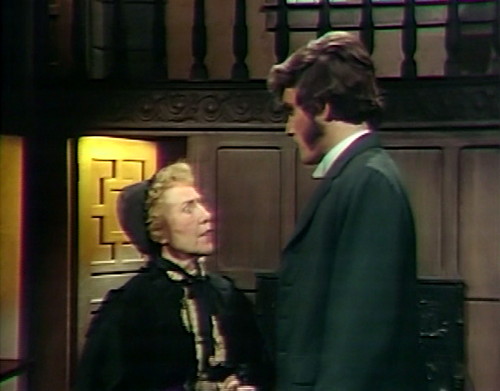
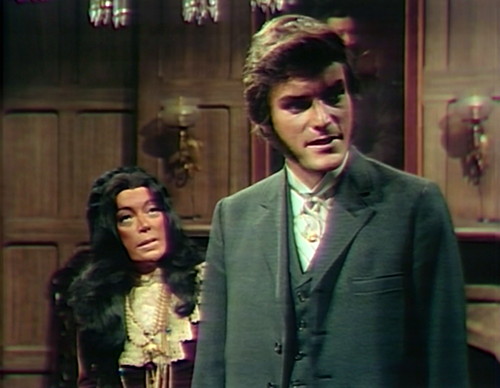
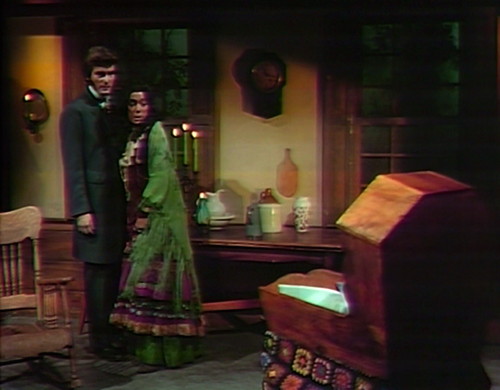
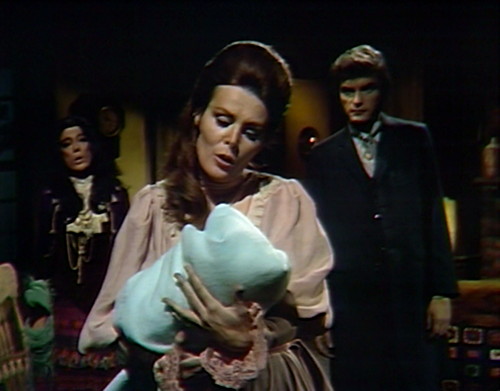
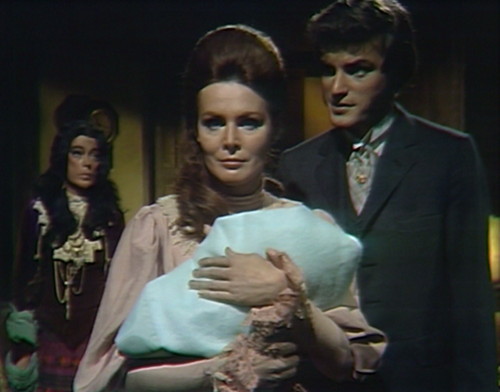
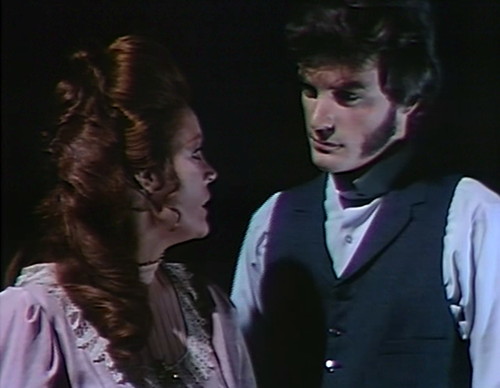
“Hero” technically doesn’t mean “heroic” (yes, it’s complicated). The primary definition is usually just “main character of a dramatic work” (or “protagonist”) but an expanded one is “person or main character of a literary work who, in the face of danger, combats adversity through impressive feats of ingenuity, bravery or strength, often sacrificing his or her own personal concerns for some greater good.” That would include Barnabas and Quentin at the height of their popularity — Barnabas more so now, when his motives aren’t entirely Vicki-related. The series focuses on his “mission” and how his goal is to “save two lives.” Yeah, he kills random people and family members in pursuit of that goal, but hey, no one’s perfect.
You can still be a jerk and a story’s “hero.” I’d disagree slightly that the only difference to Barnabas’s character is that he starts to care whether David lives or dies. He starts to make friends (first Julia, after the 1795 flashback and then arguably the Collins family). Yes, he’s shady and hides things from them like his murder lab, but he’s presented as genuinely caring about them. He seems a clearly different character from the 1967 pre-1795 Barnabas who was never depicted as having genuine feelings for other people.
Quentin is the film noir anti-hero. His past is openly being modified to this end. That’s why you have him trying to undo Petofi’s spell on his family rather than trying to exploit it to his own end. Violet Welles even had Quentin putting a picture of his dead wife in his room, as if he didn’t murder her. And now we’re not only “writing out” his children (so justifying his not actually spending any time with them) but this episode even tries to make that a “selfless” act on Quentin’s part. I don’t think it’s about making him more sympathetic or more likable. But it does make him more interesting. It adds layers to him beyond “good looking bad boy.”
I’d also argue that Quentin threatening to kill Charity in cold blood (even featuring Quentin in a threatening cliffhanger again) is to balance these attempts so that he isn’t “neutered” as a character (need we remember the “Barnabas the Butler” stage). There still needs to be an “edge” to Quentin because it means that he’s capable of doing anything (good or bad), which makes him surprising.
Actually the writers are trying to meld “Barnabas the evil vampire” with “Barnabas the butler” and are finding their way. Barnabas has a lot to learn yet.
Sorry for the double: But the scenes between Jenny and Quentin are classic comic book retcon. I don’t think we’re even supposed to remember the particulars of their relationship beyond Quentin’s vague smoothing over it and “apology.” Jenny also appears perfectly sane, as if death has removed all the damage inflicted upon her in life.
I agree. Soaps still – despite the improved ability of fans to re-view old episodes – act like we all have recurrent amnesia and can’t remember what happened last week without a flashback. (This gets especially bad when a soap is more popular, and trying to cater to throngs of new viewers.)
DS at least has the defence of having existed at a time before VCRs. So if the writers want to make Quentin “sympathetic,” they can gloss over the details and just remind us that Quentin was nasty to Jenny, have him make a sad face, and move on. Then the one or two housewives and school kids who remember that Quentin was nasty to Jenny are appeased.
Of course, this fails miserably for those of us who have been able to watch the series through five, six, etc. times, which is more or less just a DARK SHADOWS problem.
Quentin’s speech to Jenny sounds almost like a rewritten version of “The Way We Were.”
(I’ve only ever seen it once, but that in turn sort of looks ahead to “Up The Sandbox,” that really odd comedy with Barbra Streisand and David Selby himself.)
Replace “Barnabas” with “Sonny” and you’ve basically written a blog about General Hospital. That almost makes me forgive that show for its Sonny fever. 🙂
Except Barnabas was a really compelling character and Frid was an actor who could being huge nuance to his role. Sonny and Maurice, not so much. Plus they never had to vilify Barnabas’ antagonists the way they do with all of Sonny’s (still mad about making AJ a bad guy for wanting to be a good father).
Jenny’s ghost can’t even stay consistently mad or un-mad. She’s going to appear to Chris in a couple months back to her old crazy self.
Was it a couple of episodes ago when Magda realized that Julianka’s curse was a threat to the children but more so the boy because he was a boy and thus more lovable? (And because the writers needed to kill him?) That always struck me as really kind of out of character. This plotline is so weird!
It wasn’t that boys were more lovable, but that they were more valued in their society. I don’t know if that’s true in Romani culture or not, but it was true in many others, and continues to be, even now.
I don’t think they’re trying to make Quentin sympathetic; there’s no reason to do that. We already like Quentin. I think what they’re trying to do is ease the female conscience.
Quentin is incredibly attractive, but being attracted to someone heinous is unacceptable. But being a good father is the kind of thing that hits a woman’s brain in a particular way. We cut a good father a whole lot of slack. So if Quentin is a good father, my romantic thoughts about him don’t make me a bad person. I can watch him every afternoon at four without guilt.
I always thought that the whole thing with Jenny’s ghost and Lenore and Quentin promising never to have anything to do with her was just a way to completely seal the deal on why nobody knew that he had children at all. I mean, eventually people could have changed their minds and softens their hearts, Lenore might have been brought into the family fold, or at least l come looking for her real parents when she grew up. But Quentin’s promise sort of goes to explain how the secret was kept so thoroughly for so long.
Once Barnabas assumed the role of the “family protector,” he became the de facto “hero” of the show. This actually started in 1796 when became Vicky’s protector (for no logical reason).
Just starting to think about the fact that Carolyn and Chris are related through Quentin and were in a relationship. Yuck!
Third cousins, I think. They have the same great-great grandparents–the deceased son and daughter-in-law of Edith. So not that close; most people don’t know their third cousins. I was crushing on a cute guy in high school until my mom told me he was my second cousin. Now that’s yucky!
Heather, remember that Carolyn and Chris are third cousins — that’s not too consanguineal. The Queen of England and her husband are third cousins — twice. On the subject of “the hero,” as a soap watcher for decades, I’ve observed that they dispensed long ago with heroes and replaced them with anti-heroes. Take One Life to Live, for example. “Good guys” had to be either dropped (like Larry Wolek) or given darker shades (like Clint Buchanan). The same is true for women: heroic Viki Lord and Nora Buchanan had to cheat on their husbands, brothers Clint and Bo. The anti-hero, from Marco Dane to Todd Manning, became more popular characters because — to paraphrase Danny — they made the story more exciting. And, I think, they played more into viewers’ fantasies. Soaps, at some point, stopped becoming morality stories and became entertainment designed to keep you coming back for more.
At what point did Quentin’s daughter acquire a name? Did his son ever have one? I know, picky picky.
I think the inconsistency we’re all seeing in the characterization is a conflict between Dan Curtis, who wants a more sympathetic Quentin (which, he thinks, will draw more viewers) and the writers, who want to continue down the villainous path as originally planned.
As for Barnabas, he’s been so thoroughly displaced by Quentin that the next time we see him I expect he’ll be busing tables at the Blue Whale.
“the next time we see (Baranabus) I expect he’ll be busing tables at the Blue Whale.” Good one, Straker!
I mean, “Barnabus,” not “Baranabus;” although “Baranabus” is not bad.
Though, actually, let’s tr “Barnabas.”
*”try” … LOL!
I’m disappointed you didn’t find Louis Edmond’s performance worth mentioning. This episode is remarkable for both Edward’s gentleman’s gentleman & the weird mashup of Jenny’s lullaby with Colbert’s cello melody (twice!).
I’m disappointed you didn’t find Louis Edmond’s performance worth mentioning. This episode is remarkable for both Edward’s gentleman’s gentleman & the weird mashup of Jenny’s lullaby with Colbert’s cello melody (twice!).
Is that a tape edit just before Edward strangles Quentin?
Much as I love Marie Wallace, she’s no Judy Garland when it comes to singing. To be more emphatic, her singing is as flat as a pancake. And we had to hear it twice!
And what’s with Quentin’s falsetto-voiced moaning as he’s being dream-strangled by Edward, the new gentleman’s gentleman. Whom I love, btw. Louis Edmonds (sp?) would have made a wonderful Jeeves.